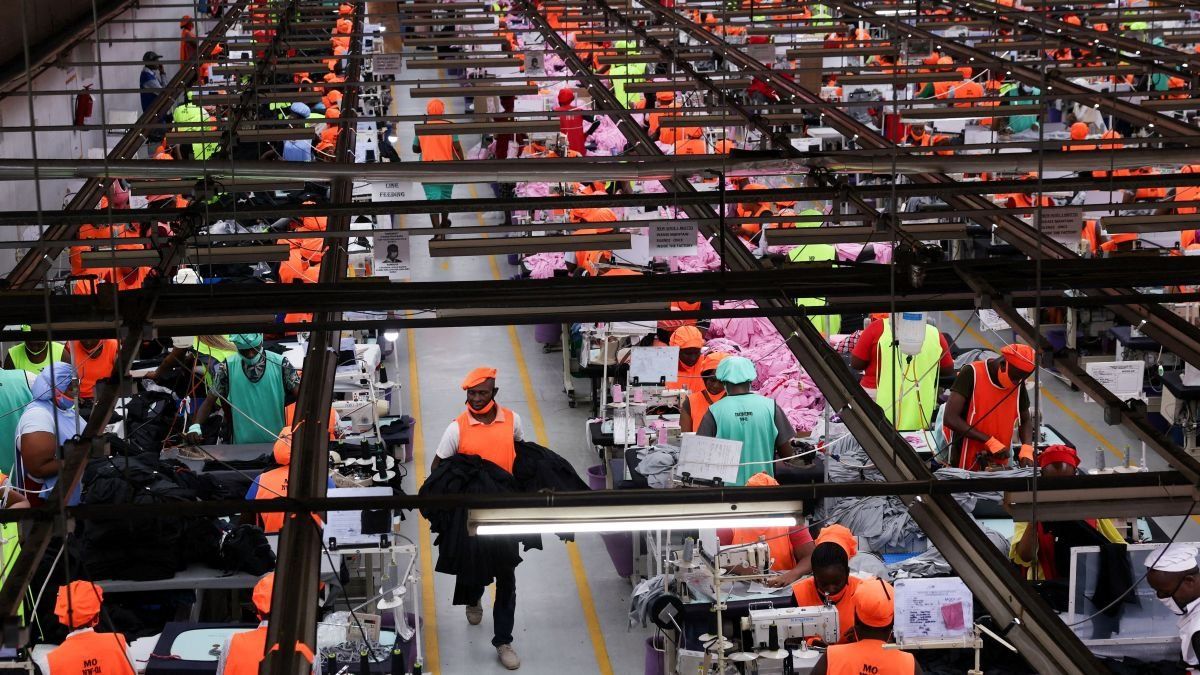The African Growth and Opportunity Act, a trade pact that allows many products from 32 sub-Saharan African states to have free access to US markets, is set to expire in less than a week.
The White House still hasn’t said whether it will renew it.
First signed in 2000 by then-US President Bill Clinton, who saw it as a way to spread democratic ideals in parts of Africa, the deal hasn’t always lived up to expectations. Trade between the countries involved did initially rise, but has since dropped. For most of the countries involved, exports under AGOA account for less than 1% of GDP.
“AGOA’s highly imperfect. It’s a trade regime, and some countries have clearly done better than others,” Brookings Institution senior fellow Witney Schneidman, who was involved in passing and implementing AGOA, told GZERO. “But it needs to be strengthened, not killed.”
Which African nations are the main beneficiaries? South Africa has been by far the biggest beneficiary in terms of raw numbers, exporting nearly $56 billion in non-petroleum products under AGOA from 2001-2022 – specifically, car manufacturers based in South Africa have benefitted immensely. Renewing AGOA was a big reason why South African President Cyril Ramaphosa travelled to Washington in May. Nigeria, the next biggest partner, exported $11.2 billion under AGOA in that timeframe.
As a proportion of output, the country most reliant on AGOA is one that reportedly “nobody has ever heard of”: Lesotho. This landlocked country in southern Africa has built a significant textiles and garments sector on the back of AGOA, such that exports under the trade agreement account for 10% of its total GDP. An end to AGOA, on top of the 15% tariffs implemented at the start of August, would devastate the country’s two million people.
“Lesotho is the biggest beneficiary today, with the least alternative to fill the economic gap,” Ronald Osumba, a political strategist who once ran to be Kenya’s vice president, told GZERO.
For other countries, the importance of AGOA revealed itself when they were no longer included in the pact. Ethiopia was suspended from the pact in 2022 over “gross violations of internationally recognized human rights” during the Tigray War. Exports to the United States have plummeted since, several firms have left the country, and over ten thousand jobs are now gone. It was even worse for Madagascar when it was temporarily suspended from the pact in 2010: its GDP dropped 11%.
So what’s in AGOA for the US? Put simply, counterbalancing China and Russia.
“Africa is shifting east,” said Osumba. “China and Russia are having more influence on the continent today than any other time.” Renewing AGOA could help the US balance that influence.
Why does it matter? AGOA nations hold a sizable chunk of the world’s rare-earth minerals. Five of the top 15 sources of rare-earth minerals worldwide are in AGOA. In particular, the Democratic Republic of the Congo produces over 70% of the world’s cobalt, a mineral that is needed for the production of electric minerals. If AGOA isn’t extended, Osumba warned, Washington’s access to these critical minerals could be curtailed.
“There’s a concern there for the US in terms of access to natural resources.”
For Schneidman, it’s not just access to critical minerals: It’s also about leaving business opportunities on the table. He argued that, when it comes to using “trade over aid,” the Trump administration isn’t putting its money where its mouth is, vacating the area to its own detriment.
What’s stopping the US from renewing? US President Donald Trump’s general approach to trade and tariffs provides some hints. He is unafraid to use levies as a way to punish countries who he believes distort markets – the high levies he placed on countries including Brazil, China, India, and South Africa are a testament to this. AGOA grants members states tariff-free to US markets, but doesn’t give American firms anything in return, so it’s possible that Trump sees this as unfair. Plus, his “America First” foreign policy suggests he doesn’t share Clinton’s desire for democracy to spread worldwide.
But Frank Matsaert, an African trade & infrastructure expert at the Tony Blair Institute, believes the punt on AGOA renewal goes beyond this: he believes there’s an information gap.
“They’re not as aware of the potential effects of not renewing it,” Matsaert told GZERO. “If AGOA isn’t renewed, that could threaten $42 billion of bilateral trade.”
Is there any chance of a last minute change? Osumba isn’t hopeful.
“If it was to be done, this conversation should have already started a long time ago.”
Matsaert, meanwhile, retains some hope, providing that someone tells the US president the value of AGOA to his nation.
“This has had a big, positive impact on Africa. It could continue to have a positive impact, particularly at a time when the US is trying to diversify its supply chains,” said Matsaert. “The US consumer benefits, Africa benefits. Why not extend this?”
